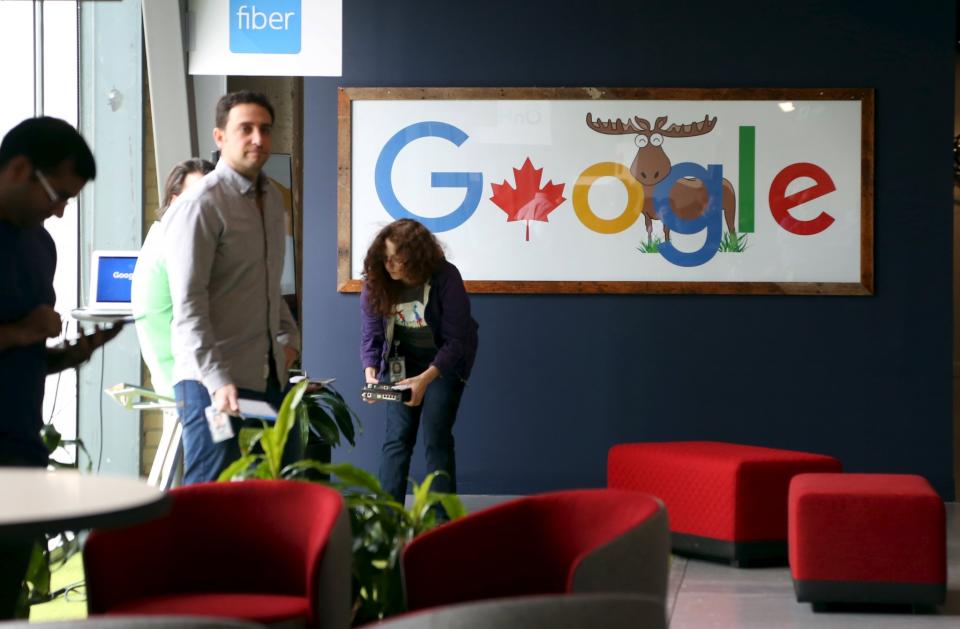Tech firms look to Canada in light of Trump H1-B visa reform

U.S. President Donald Trump signed an executive order this week asking Congress to review the process granting H1-B work visas.
The move potentially halts America’s tech companies (Google, Amazon, Facebook, etc.) from expanding, as they rely on these workers for skills such as coding and won’t be able to hire the world’s best and brightest in the numbers they need.
“Technology companies everywhere know that their success relies on their people, and to compete globally they need to attract the best. The H-1B visa in the U.S., similar to Canada’s temporary foreign worker program, lets American companies bring in best and the brightest from around the world – many of which are Canadian,” says Robert Watson, president and CEO of the Information Technology Association of Canada, the national voice of the information and communication technology industry in Canada for over 60 years.
For President Trump, this a return to the ‘Buy American, Hire American’ policies that he touted during the election with the aim of incentivizing companies to hire more American workers. But while this executive order may have good intentions, Watson and others in the American tech sector predict it will not work as intended.
“By creating uncertainty around the H-1B visa program, the Trump administration is making some U.S.-based technology companies question if they’ll be able to access the talent they need to grow. I have heard several companies rethinking expansion strategies directly because of this review,” adds Watson.
“The tech industry depends on about 55,000 H1-B workers each year to keep the technology Americans depend on working. If these teams are forced to leave the U.S., the companies will likely adapt by moving foreign workers outside the U.S. and not hiring American workers,” says Michael Tippett who, in addition to founding several early stage technology companies in New York and Vancouver, was the director of new products at Hootsuite for two years.
America’s loss, Canada’s gain
While Trump is attempting to limit the number of highly skilled foreign workers able to work in the U.S., the Trudeau government changed Canada’s immigration selection process to make it easier for skilled foreign workers and foreign students to become permanent residents. The Global Skills Strategy aims to provide a more streamlined, fast and reliable process for companies to hire skilled workers from around the world and bring them to Canada. Plus, recent adjustments to the Temporary Foreign Workers Program aim to speed up the process to bring more highly skilled workers for in-demand professions over, while improving working conditions for those in lower-skilled professions.
The Global Skills Strategy aims to provide a more streamlined, fast and reliable process for companies to hire skilled workers from around the world and bring them to Canada. Plus, recent adjustments to the Temporary Foreign Workers Program aim to speed up the process to bring more highly skilled workers for in-demand professions over, while improving working conditions for those in lower-skilled professions.
“I think Canada will absolutely benefit from a more open approach. We have spoken to several global technology companies looking to increase their footprint in Canada as a result of this review because they know they can bring in talent and assemble the teams they need,” says Watson.
“The H-1B review could also mean more Canadian computer science and engineering graduates look to work for or start companies in Canada instead of heading to the U.S. after graduation.”
It’s already starting to happen. In addition to his career shepherding tech start-ups, Michael Tippett is the co-founder of True North Ventures, a start-up aimed at assisting tech companies in creating turn-key Canadian subsidiaries, so they don’t have to dismantle their skilled foreign worker teams.
Since Trump’s executive order, his phone hasn’t stopped ringing.
“We’ve seen a bump in traffic since the announcement. More calls are coming in,” says Tippett. “Our bulletin service is also starting to get a lot of attention. It’s a subscription service companies can subscribe to that gives them options of what they can do in the event of new regulations.”
How does Tippett help employers set up a Canadian subsidiary? He will flies the company’s workers to Vancouver – where he is based and also in the same pacific time zone of California’s Silicon Valley – sets them up in a hotel where they can work remotely and gives them access to immigration lawyers so they can discuss next steps and the best course of action. True North charges $6,000 for every employee brought to Vancouver.
“Canada has a very open immigration policy, a robust technology infrastructure and world class talent. We also have geographical proximity to U.S. tech hubs like New York, (Toronto and Montreal) San Francisco and Seattle (Vancouver). Wherever these U.S. tech companies decide to move their teams, economies will benefit.”
Prior to Trump’s executive order, major tech firms were already opening offices here. Vancouver already has offices for Google, Microsoft, Facebook and Amazon, Google opened a new engineering hub in the Kitchener-Waterloo region of Ontario in 2016 and Tippett told Vancouver’s News 1130 at least five to ten Shopify or Hootsuite-sized companies have contacted him about setting up hubs in Vancouver.
“Forty-three per cent of founders of Silicon Valley companies are not American born, so theoretically you could have up to half of the companies in Silicon Valley could be impacted. You’ve got companies with 10, 20 and 30 per cent of their employee base being H1-B workers. So massive chunks of Silicon Valley could be relocated and the question for them is not if, but where they go to,” Tippett told them.
b

 Yahoo Finance
Yahoo Finance 